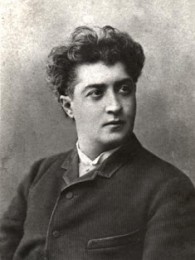Aleksi-Meskhishvili S. Lado

Vladimir S. Aleksi-Meskhishvili, Lado Meskhishvili (b. February 28, 1857, Tbilisi – November 24, 1920, Tbilisi) was an actor and a director, People's Artist of Georgia (the title was awarded posthumously in 1930).
He studied in one of the private boarding schools of Tbilisi and then received higher education in medicine at the Moscow State University. He could not graduate from the university due to illness, returned to his homeland and started working as a teacher at the Women's School in Telavi. He worked there for three years and participated in the plays of Russian theatre lovers at the same time. In 1881, he joined the Georgian Drama Troupe. In 1887–1890, he performed on the Russian stage.
In 1890–1896, he led Georgian drama groups in Tbilisi and in 1897–1906 — in Kutaisi. He played the leading roles in his own productions (Gaius Gracchus by James Sheridan Knowles and The Weavers by G. Hauptmann), which protested against tyranny and social injustice. In 1906–1910 and in 1915–1920 he worked in the Russian theatre (in the Moscow Art Theatre in 1907). In 1910–1914 he led the theatre of Tbilisi and in 1914–1915 the theatre of Kutaisi. He portrayed his characters with romantic passion and poetic excitement. Some of his best roles include: Levan Khimshiashvili (Homeland by D. Eristavi), Gaioz Paghava (Siblings by V. Gunia), Suleyman (Treason by A. Sumbatashvili), Hamlet (Hamlet by W. Shakespeare), Uriel Acosta (Uriel Acosta by K. Gutzkow), Caesar (Julius Caesar by W. Shakespeare), Karl and Franz Moor (The Robbers by F. Schiller), Ruy Blas (Ruy Blas by V. Hugo), the Mayor (The Government Inspector by N. Gogol) and others. He staged more than 100 plays, raised many prominent actors of the Georgian theatre. Aleksi-Meskhishvili translated a number of dramatic works for the Georgian theatre.
During his stay in Russia in 1915, the Moscow film company “P. Timan and F. Reingardt” invited him to participate in one of the films of the “Russian Golden Series”. In 1917–1919, he worked in a newly established film company “Biofilm”. Only two of the films with his participation have been preserved: The Shame of the House of Orlovs (director V. Turzhansky, 1918) and The God of Vengeance (director A. Shifman, 1918).
In 1940, the Kutaisi Drama Theatre was named after Lado Meskhishvili.
Literature: ბურთიკაშვილი ა., ლადო მესხიშვილი, თბ., 1962; ზურაბიშვილი ი., ოთხი პორტრეტი, თბ., 1949; ნარიმანოვი ზ., ორი სეზონი მესხიშვილთან, თბ., 1957; ფაღავა ა., ლადო მესხიშვილი, თბ., 1957.


